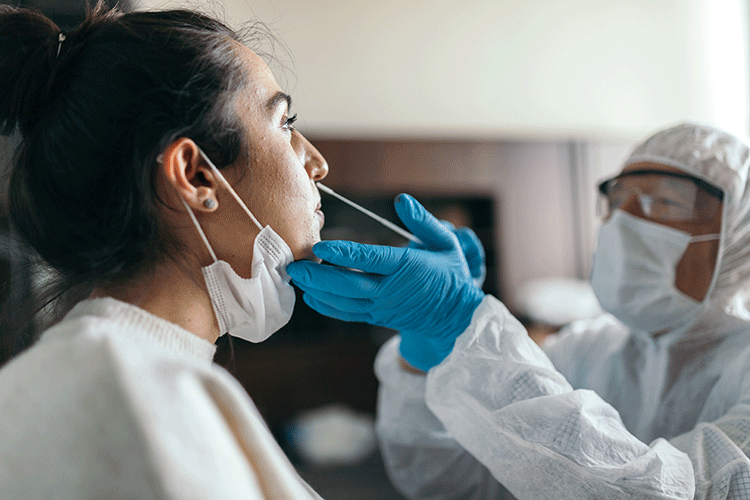
As we enter the summer of 2021, COVID-19 infection rates are at an all-time low.
In the United States, with 92% of seniors over 65 having received at least one COVID-19 vaccine, the most vulnerable are protected. With nearly half of the population fully vaccinated, there are fewer individuals that can get infected, fewer that are at risk for severe infection, and fewer that can spread it to others.
Yet there is still fertile ground for the spread of more resistant SARS-CoV-2 variants in those individuals not yet vaccinated, especially in communities with low vaccination rates.
What are the variants of concern that are now circulating in the United States, and in Illinois?
The World Health Organization (WHO) recently re-named the SARS-CoV2 variants of concern: alpha, beta, gamma, epsilon and delta.
The B.117 (alpha) variant is more transmissible than previous variants. But antibodies from vaccination can neutralize it nearly as well as the original strain. The alpha variant became the predominant variant in the United Kingdom during the fall of 2020-21. Predictions that the alpha variant would become predominant in the U.S. held true, rising from less than 1% of cases in January to 69.5% of cases by the end of May 2021.
The B.1.351 (beta) variant predominant in South Africa, and the P1 (gamma) variant predominant in South America, are also more transmissible, but they carry more worrisome mutations that result in decreased antibody neutralization of the virus.
While antibodies from patients who recovered from COVID-19 do not neutralize the alpha or gamma variants, antibodies from patients who were vaccinated with a Moderna or Pfizer-BioNTech mRNA vaccine do neutralize the virus. This is because vaccination elicits antibody levels several fold higher than after natural infection.
The gamma variant increased to 8% of cases nationally and 24% in Illinois by the end of May 2021, while the beta variant was 0.7% nationally and 1.3% in Illinois. The gamma variant is also resistant to the monoclonal antibodies bamlanivimab+etesevimab but still susceptible to casirivimab+imdevimab.
What do we know about the delta variant?
The WHO has noted the delta variant, which was first identified in India, is now spreading in more than 60 countries, including the U.S.
The B.1.6172 (delta) variant was estimated by Public Health England to be 60% more transmissible than the alpha variant, which was 50% more transmissible than the original virus. Patients infected with the delta variant have higher levels of virus detected in the airways than the alpha variant. Like the gamma variant, it is more resistant to neutralization by antibodies. The delta variant was responsible for many of the cases in India during spring 2021.
In the United Kingdom, over three quarters of the adult population has received at least on dose of a COVID-19 vaccine and as a result, cases and deaths plummeted from a high of 60,000 cases a day in January to 2,000 a day by May 7. At the end of May 2021, cases began to rise again to 7,000 a day, by June 7, with 90% due to the delta variant. Hospitalizations have also increased. An early analysis suggests the likelihood of hospitalization in patients infected with the delta variant is twice that compared to those infected with the alpha variant.
Should we be worried about the delta variant?
If you are fully vaccinated, you are less likely to get infected and unlikely to get severe infection. While the delta variant is more contagious and causes more severe illness, the two-dose COVID-19 vaccines can effectively neutralize it.
The Pfizer-BioNTech vaccine was 88% effective against the strain after the second dose, but just 33 percent effective after one dose. The Moderna vaccine would likely provide similar protection. While the Janssen (Johnson & Johnson) one-dose vaccine has not been studied against the strain, it is likely to provide significant protection.
Vaccination is effective in decreasing the chances of getting infected, become severely ill or symptomatic if infected, and in passing the virus to someone else. Vaccination is the best way to stop the spread of variants.
Those with compromised immune systems or on medications that compromise immune function should speak to their doctor and may need to take the same precautions as those not yet vaccinated.
Parents of kids younger than 12, who are not old enough to be vaccinated yet, should continue to exercise caution — masking indoors, avoiding crowds and maintaining physical distance from others—until younger kids can receive the vaccine.
Edward-Elmhurst Health now has COVID-19 vaccine appointments available to anyone in our communities age 12 and older. It is easy to schedule a vaccine appointment. You no longer need a MyChart account. Schedule your COVID-19 vaccine now.
For the latest updates on the COVID-19 vaccine, please check EEHealth.org/coronavirus/vaccine.
Are you wondering whether to get the vaccine? Read our blog to learn more.
The information in this article may change at any time due to the changing landscape of this pandemic. Read the latest on COVID-19.